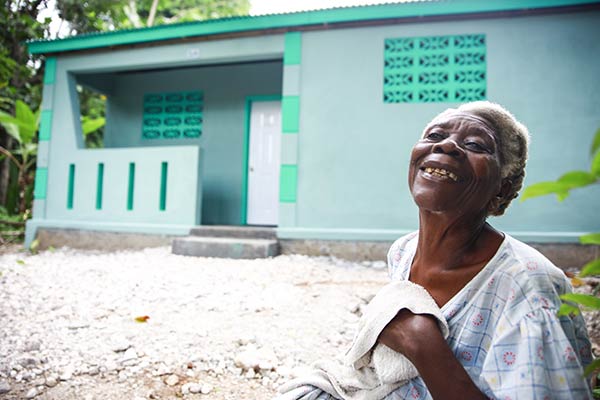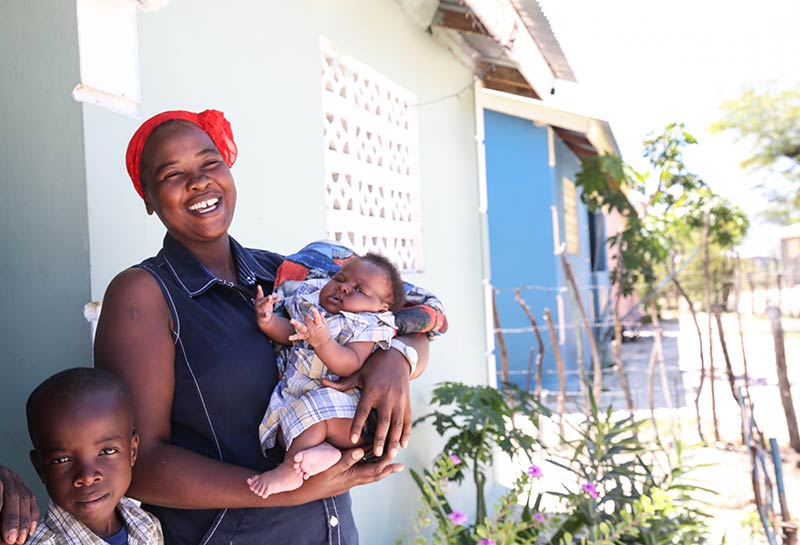The statistics reflect the grim reality: According to the Inter-American Development Bank, a funding source for development throughout Latin America and the Caribbean, nearly half of residents in the region live in ”unsuitable housing built with precarious materials or without basic amenities.”
The houses, which are typically rudimentary shacks assembled from scraps of wood, tin sheets, plastic bags or mud and thatch, are leak-prone, providing no safe shelter for families. They often have makeshift wood-burning stoves that fill the indoor air with smoke, creating a dangerous health hazard.
Outhouses – small, enclosed structures having one or two holes in a seat built over a pit to serve as an outdoor toilet – are common. In some cases, a hole dug in a remote area of a community has to suffice.
A front door is a luxury
Because many of these shacks lack a solid door, a piece of wood secured with a wire might be all that provides a semblance of security. When these materials aren’t available, the “door” might be a bedsheet that makes families easy targets for strangers looking to steal from them or bring harm to their children.
A secure home remains an elusive dream for countless impoverished families, but Food For The Poor offers innovative housing solutions that include sanitation, a water component, a ventilated cooking area, a sink, furnishings and solar-powered lighting.
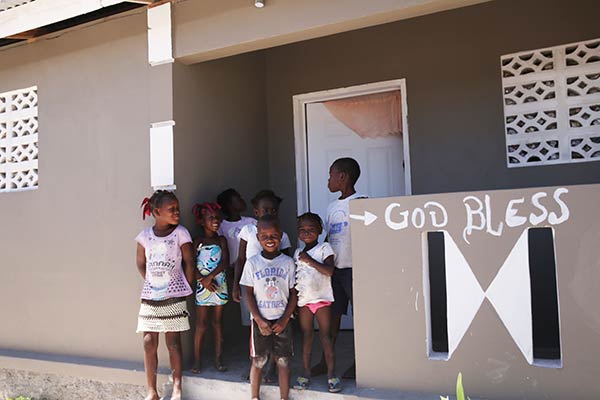
An important feature is indoor toilets, which improve families’ overall hygiene, reduces the spread of germs and increases safety by eliminating the need for an outhouse.
Innovative housing partnerships generate social progress
Food For The Poor’s collaborative efforts with donors and partners, such as corporations and businesses, not only provide a brighter future for families who receive new homes, but they empower entire communities, leading to social progress.
Effective partnerships go beyond construction
Once the homes are handed over to the families, the ripple effect begins. Living in a stable house with a solid roof, walls and concrete foundation creates an environment conducive to physical and emotional well-being.
- Families are shielded from the elements, protected from the spread of diseases, and provided with a secure space to nurture their relationships and raise their children.
- The newfound stability that comes with a proper home empowers individuals to break free from the cycle of poverty, enabling them to focus on pursuing education, seeking employment opportunities and improving their overall quality of life.
Giving a family a new house doesn’t mean their struggles will end, but it helps provide them with a secure foundation, said Susan James-Casserly, longtime Project Manager for Food For The Poor.
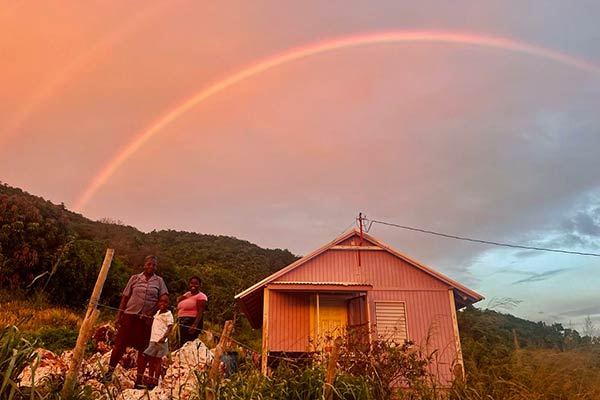
In her more than 20 years of working for the nongovernmental organization (NGO), she has witnessed amazing transformations in families who received Food For The Poor homes. James-Casserly recalls a woman named Joy who lived with her family in a rotting wood shack with a rusty roof in Jamaica, one of the countries where Food For The Poor has helped for over 40 years. After receiving a new home, the transformation was incredible.
“I remember that she radiated Joy,” James-Casserly said. “Her children were immaculately dressed in their freshly ironed school uniforms. They were eating a meal before they headed off to school. The new home was an answer to her prayers, and this gift, so generously contributed by our donors, reminded Joy that she is loved by God.”
Such transformations are possible with the support of generous donors, some of whom have dedicated years to building homes for impoverished families. These housing partnerships lead to progress in lifting up a family from severe poverty.
Corporate partnerships can provide several homes
In Jamaica, partnerships are making a significant impact for families in need of safe housing. One partnership with is the British Caribbean Insurance Company (BCIC).
As part of its 60th anniversary celebration, the company committed to building six houses through Food For The Poor’s “Shelter With a Purpose” program. Such housing partnerships help to build a better Jamaica, said Craig Moss-Solomon, Executive Director of Food For The Poor’s Jamaica office.
“With a partner like BCIC, we hope we can continue to spread our arms all across Jamaica and help give people the hope they need to keep pushing,” Moss-Solomon said. “Our partnership with BCIC is an example of just how much of a difference corporate Jamaica can make in this country if they really wanted to.”
Another company partnering with Food For The Poor in Jamaica to build homes for impoverished families is Boom Energy Drink, a Jamaican-based company. The company built 10 homes with the charity, including one for a great-grandmother who couldn’t make her rent payments for many months. The corporate initiative was a way for the business to give back to fellow Jamaicans who were in need.
Individuals also team up with Food For The Poor to build homes, from donors who choose to build one home to those who wish to build several. Age doesn’t matter, as evidenced by Rafe Cochran, who started raising money at age 9 to build homes for impoverished families. The talented golfer founded a golf tournament to build homes in Haiti and renovate schools in Jamaica. The seventh annual Rafe Cochran Golf Classic took place in May in West Palm Beach, Florida.
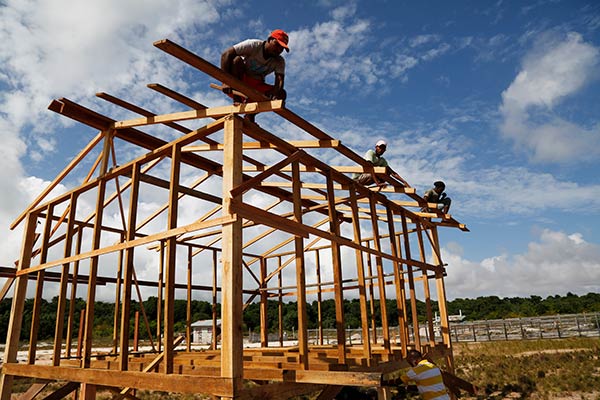
Housing partnerships can also be entire committees that organize fundraising galas. Families living in severe poverty can have their lives transformed by such beneficial partnerships building homes.
“A FFTP house truly changes the lives of so many. It’s hard to imagine not having a roof to sleep at night, but it is so heartwarming to see the transformation a roof can provide,” said Soraya Louis, Regional Office Manager for Food For The Poor’s Haiti office. “The families who benefit from this gift find not just shelter but solace from a plague of issues.” The Boca Grande Hope for Haitians gala earlier this year raised enough money to build 37 homes in the remote area of Périgny, Haiti. Boca Grande Hope for Haitians has built more than 600 homes for Haitians in need with Food For The Poor since 2009.
Poverty in Central America means a lack of safe housing
Central America also suffers from overcrowding and unstable homes due to the large amount of poverty-stricken families who cannot afford safe housing.
According to an article in La Prensa Latina, Central America has a population of 50 million. Many people are impoverished, including 73 percent of Hondurans who live below the poverty line and 60 percent of Guatemalans who live in extreme poverty. El Salvador has more than half of its people living in cramped conditions with three or more people sharing the same room.
Food For The Poor has continuously addressed this issue by building new, stable and safe housing for families living in poverty. In Honduras, the organization has built more than 10,000 homes.
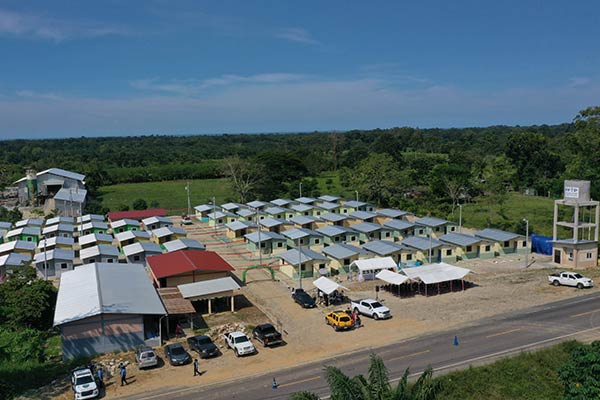
“This roughly equates to housing at least 50,000 men, women and children … This is not an impossible feat with the type of donors FFTP is blessed with; our donors are partners,” said Sabrina Diz, Food For The Poor’s Project Manager in Honduras.
Donors provide the funding, and the homes are built with the help of longtime partner CEPUDO, a nonprofit organization based in Honduras. The transformation of families who receive new homes is remarkable, CEPUDO President Linda Coello said.
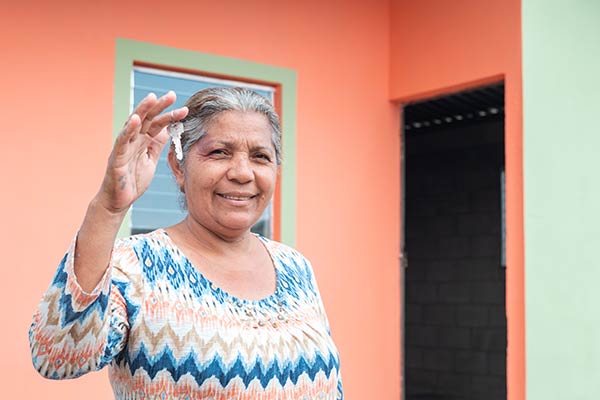
“The parents, they feel they are worthy,” she explained. “Their whole attitude changes when they can take a shower in complete privacy, something they never did before. They can have a permanent job because they can give an address. They can be sure their children are left in a secure place where they will be safe till they come back from work.”
Housing partnerships are important components to building homes for those living in poverty. Collaborative efforts mean homes can get built quicker, Coello said.
“Partnerships are very important so we can join efforts to make changes faster and in more effective way,” she added.
Partnering with Food For The Poor to build safe housing can mean changing lives for the better. These families, who seldom slept due to poor conditions, finally have safe housing that provides protection during storms and a way out of poverty.
If your company would like to learn more about partnering with Food For The Poor to build homes, please contact Soraya Garcia Machado in Corporate Relations and Development via email at [email protected] or call 954-427-2222, ext. 6155.
To donate individually to Food For The Poor to provide housing for those in need, please visit our website.
